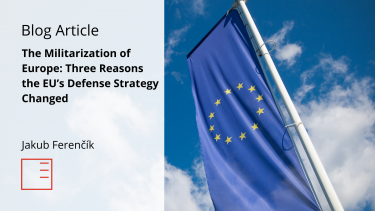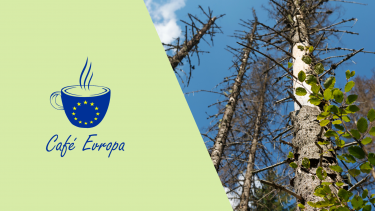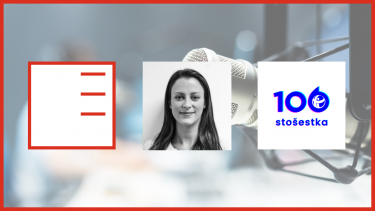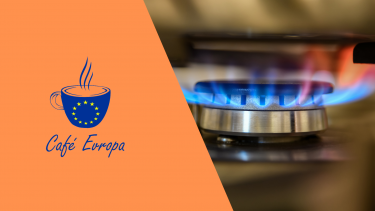BLOG: The Militarization of Europe: Three Reasons the EU’s Defense Strategy Changed
Jakub Ferenčík wrote a blog on the topic: The Militarization of Europe: Three Reasons the EU’s Defense Strategy Changed. In his blog, he writes for example about three reasons why the EU defence strategy has changed or the militarisation of Europe and the future of deterrence.
Zjistit více PDFCafé Evropa in the regions: the future of forests in Vysočina - have we learned from the bark beetle calamity?
We would like to invite you to a debate within the Café Evropa series, this time on the topic "The future of forests in Vysočina - have we learned from the bark beetle calamity?". The debate will take place in person, in the Painted Hall, Museum of Vysočina Jihlava and will also be available to watch online on Facebook. Is the situation really so scary and what does the future hold for the forests of the Vysočina region? What is the current state of forest cover in different parts of the Vysočina region? What circumstances and causes have led to the current state - and which ones are man's fault? What are the consequences of the disaster for nature, wildlife and humans? Can any positives be found in the whole situation? Will our relationship with forests and landscapes change in the future?
Zjistit víceStošestka: How does the victory of Vučić and Orbán threaten the values of the rule of law?
Jana Juzová, EUROPEUM Research Fellow, participated in the new episode of Transparency International's Stošestka podcast. From Brussels, she explained how the elections in Serbia, Hungary, Slovenia, and France decided the political future of Europe.
Zjistit vícePolicy Paper: The Future of Energy Poverty: Will the Social Climate Fund be enough for a Just Transition?
Naše výzkumná pracovnice Katharine Klačanský napsala policy paper na téma "Budoucnost energetické chudoby: Bude Sociální klimatický fond stačit pro spravedlivý přechod?" ve kterém zmiňuje například, že spravedlivý přechod k zelené ekonomice je takový, který nikoho nenechá pozadu.
Zjistit více PDFINVITATION: Implications of the Russian Invasion of Ukraine for the Western Balkans: Challenges and Options for the Czech Presidency
The EUROPEUM Institute for European Policy, the Balkans Policy Advisory Group (BiEPAG) and the European Fund for the Balkans (EFB) invite you to a public conference on the Balkans and its politics at the event entitled: Consequences of the Russian Invasion of Ukraine for the Western Balkans: Challenges and Opportunities for the Czech Presidency. The debate will take place on 11 May 2022 at 18:30 at Impact Hub K10, Koperníkova 10, Prague 2 - Vinohrady, 120 00.
Zjistit více PDFEURACTIV: Czech expert: EU treaty change unlikely after Conference on the Future of Europe
Our research fellow Zuzana Stuchlíková has provided a commentary for EURACTIV on the EU debate on the future of Europe, in which EU citizens are participating. In the commentary, she outlines how crucial the recommendations that will reach the final stage will be and how, if at all, the European Council will implement citizens' proposals.
Zjistit více
Decarbonization of the Czech automotive industry
After the successful delivery of last year’s project focused on the decarbonization of the Czech automotive industry, the climate team of EUROPEUM Institute for European Policy leads its second round. This time, the project aims to use already acquired knowledge, contacts and resources to help create a conducive environment for discussion between the representatives of the industry and the public sector. It will also contribute to our understanding of the decarbonization pathways through evidence-based research. Lastly, the project aims to raise social awareness about the challenges and opportunities presented by the transition of the automotive industry by organizing events and media briefings. This year’s project will be shaped by the Czech Presidency of the European Council in the second half of the year.
Zjistit více

Dekarbonizace českého automobilového průmyslu
Po úspěšné realizaci loňského projektu zaměřeného na dekarbonizaci českého automobilového průmyslu spustil klimatický tým Institutu pro evropskou politiku EUROPEUM jeho druhý ročník. Tentokrát je cílem projektu využít již získané znalosti, kontakty a zdroje k vytvoření příznivého prostředí pro diskusi mezi zástupci průmyslu a veřejného sektoru a rozšířit porozumění dekarbonizaci prostřednictvím empirického výzkumu. V neposlední řadě si projekt klade za cíl zvýšit společenské povědomí o výzvách a příležitostech plynoucích z transformace automobilového průmyslu prostřednictvím akcí a mediálních briefingů. Letošní projekt se bude navíc soustředit i na české předsednictví v Radě EU v druhé polovině roku.
Zjistit více

ČT24: EU leaders negotiate with Chinese leadership
EUROPEUM Institute analyst Alexandr Lagazzi spoke in the program Studia ČT24 about the summit between the European Union and China, which dealt with mutual future relations and economic ties. The conflict in Ukraine was the main topic of discussion on the EU side. It was China's hesitant stance and reaction to economic sanctions against Russia that was addressed, as well as China's rejection of NATO.
Zjistit více
INVITATION: Café Evropa online: The future of European energy - how to ensure stable and clean energy sources without Russia?
We would like to invite you to the Café Evropa debate on 21 March at 17:30 on the topic "The future of European energy - how to ensure stable and clean energy sources without Russia?". The Russian invasion of Ukraine has, among other things, further fuelled the question of energy security in the Czech Republic and the EU and the future of energy in our country. The current security situation points to the need to diversify energy sources as soon as possible, i.e. to secure energy supplies from different regions and countries in order to avoid excessive dependence on Russia. There are also views in the public debate that coal extraction could be temporarily increased, which would enable some countries to cover any shortfalls in resources. Is a complete or even partial halt of Russian gas supplies to the Czech Republic and the European Union a realistic option? What impact would this have on our energy security? How much further increase in energy prices can we expect in this case? How should EU countries react and help households and industry cope with the expected increase? Could a possible temporary increase in coal extraction mean a return to fossil fuels and the end of the EU's climate ambitions? Or could the current problematic situation further accelerate the energy transition?
Zjistit víceStaroměstské náměstí 4/1
Praha 1 - Staré Město
110 00
tel.: +420 212 246 552
email: europeum@europeum.org
https://www.europeum.org








